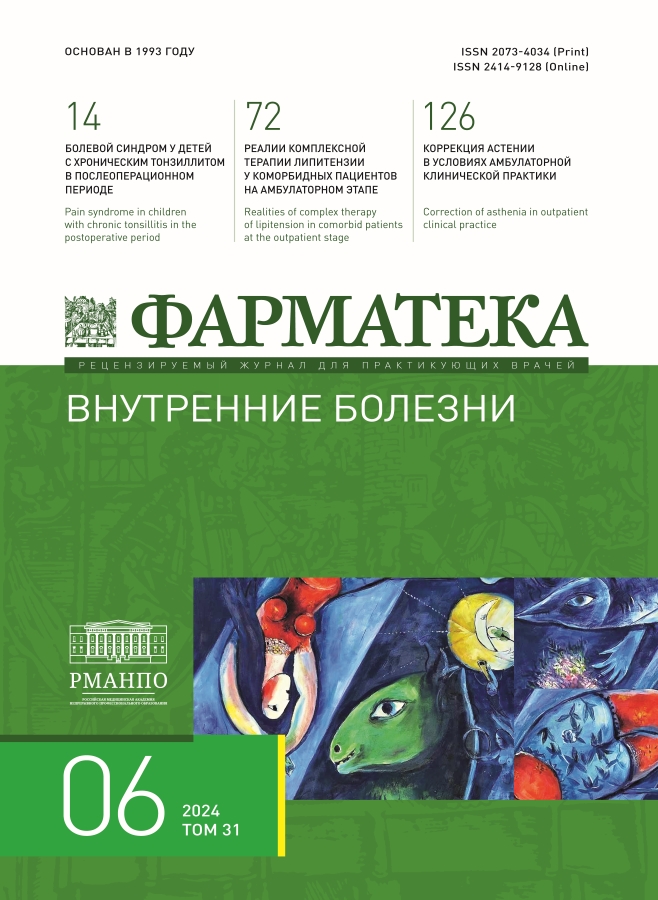Pain syndrome in children with chronic tonsillitis in the postoperative period
- Authors: Asmanov A.I.1, Pivneva N.D.1,2
-
Affiliations:
- Veltischev Research Institute of Pediatrics and Pediatric Surgery, Pirogov Russian National Research Medical University
- Department of Innovative Pediatrics and Pediatric Surgery FAPE ICEPD, Pirogov Russian National Research Medical University
- Issue: Vol 31, No 6 (2024)
- Pages: 14-17
- Section: Pediatria
- URL: https://journals.eco-vector.com/2073-4034/article/view/642758
- DOI: https://doi.org/10.18565/pharmateca.2024.6.14-17
- ID: 642758
Cite item
Abstract
Background. Chronic tonsillitis remains one of the most common diseases in otolaryngology. The standard treatment for the toxic-allergic form of chronic tonsillitis includes bilateral tonsillectomy. Currently, various methods of tonsillectomy are used in otolaryngological practice: traditional «cold» loop, electrocautery, laser, coblation, harmonic scalpel, etc. As is known, the degree of pain syndrome can vary significantly depending on the method of tonsillectomy used, but pain syndrome is still present to a significant degree and patients need analgesic therapy in the postoperative period.
Objective. Evaluation of the analgesic effect of local non-steroidal anti-inflammatory drugs and systemic analgesia in children after tonsillectomy using bipolar electrocoagulation.
Methods. A study of the quality of life of 127 patients aged 12 to 17 years after tonsillectomy was conducted. Patients were divided into two groups: the main group received only a local non-steroidal anti-inflammatory drug (NSAID), the control group - systemic analgesic treatment.
Results. The quality of life of patients was assessed using questionnaires filled out on certain days of the postoperative period. Patients in the main group had significantly less severe pain syndrome (p<0.01), the pain syndrome lasted for shorter period (p<0.01), and their ability to eating solid food recovered quickly.
Conclusion. The study showed that the use of a local drug with NSAIDs (flurbiprofen) in patients after tonsillectomy significantly reduces the intensity of pain syndrome in the early postoperative period, eliminates the need for systemic forms of NSAIDs, improves postoperative quality of life and accelerates recovery.
Keywords
Full Text
About the authors
A. I. Asmanov
Veltischev Research Institute of Pediatrics and Pediatric Surgery, Pirogov Russian National Research Medical University
Email: Pivnevand@yandex.ru
ORCID iD: 0000-0002-3116-6447
Russian Federation, Moscow
N. D. Pivneva
Veltischev Research Institute of Pediatrics and Pediatric Surgery, Pirogov Russian National Research Medical University; Department of Innovative Pediatrics and Pediatric Surgery FAPE ICEPD, Pirogov Russian National Research Medical University
Author for correspondence.
Email: Pivnevand@yandex.ru
ORCID iD: 0000-0003-3673-9272
Cand. Sci. (Med.), Senior Researcher, Department of Acute and Chronic Pathology of the Ear, Throat and Nose, Veltischev Research Clinical Institute of Pediatrics, Associate Professor at the Department of Innovative Pediatrics and Pediatric Surgery FAPE ICEPD, Pirogov Russian National Research Medical University
Russian Federation, Moscow; MoscowReferences
- Ташбаев Н.А., Калдыгозова Г.Е. Лечение хронического тонзиллита у детей. Астана медициналық журналы. 2020;106(4):231–35. [Tashbayev N.A., Kaldygozova G.E. Treatment of chronic tonsillitis in children. Astana meditsinalyk journals. 2020;106(4):231–35. (In Russ.)].
- Крюков А.И., Изотова Г.Н., Захарова А.Ф., Чумаков П.Л. Современные возможности анальгезирующей терапии пациентов, перенесших двустроннюю тонзиллэктомию. Медицинский совет. 2014;3:48–50. [Kryukov A.I., Izotova G.N., Zakharova A.F., Chumakov P.L. Modern possibilities of analgesic therapy of patients who underwent double-stranded tonsillectomy. Medical advice. 2014;3:48–50. (In Russ.)].
- Chaudhary K., Singh V., Yadav R., et al. Comparative Study of Complications Associated with Coblation Versus Conventional Tonsillectomy. Indian J Otolaryngol Head Neck Surg. 2023 Dec;75(4):2870–77. doi: 10.1007/s12070-023-03872-5.
- Wiltshire D., Cronin M., Lintern N., et al. The debate continues: a prospective, randomised, single-blind study comparing Coblation and bipolar tonsillectomy techniques. J Laryngol Otol. 2018 Mar;132(3):240–45. doi: 10.1017/S0022215117002328.
- Tunthanathip Alin, Panuwat Wongwattana. Radiofrequency Versus Electrocautery in Pediatric Tonsillectomy: A Double-Blind, Randomized Controlled Trial. Indian J Otolaryngol Head Neck Surg: official publication of the Association of Otolaryngologists of India. 2022;74,3:5616–23. doi: 10.1007/s12070-021-02950-w.
- Aldamluji N., Burgess A., Pogatzki-Zahn E., Raeder J., Beloeil H. PROSPECT Working Group collaborators*. PROSPECT guideline for tonsillectomy: systematic review and procedure-specific postoperative pain management recommendations. Anaesthesia. 2021 Jul;76(7):947–61. doi: 10.1111/anae.15299.
- Bindu S., Mazumder S., Bandyopadhyay U. Non-steroidal anti-inflammatory drugs (NSAIDs) and organ damage: A current perspective. Biochem Pharmacol. 2020 Oct;180:114147. doi: 10.1016/j.bcp.2020.114147.
Supplementary files











